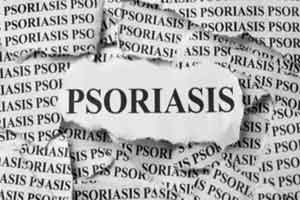- Home
- Editorial
- News
- Practice Guidelines
- Anesthesiology Guidelines
- Cancer Guidelines
- Cardiac Sciences Guidelines
- Critical Care Guidelines
- Dentistry Guidelines
- Dermatology Guidelines
- Diabetes and Endo Guidelines
- Diagnostics Guidelines
- ENT Guidelines
- Featured Practice Guidelines
- Gastroenterology Guidelines
- Geriatrics Guidelines
- Medicine Guidelines
- Nephrology Guidelines
- Neurosciences Guidelines
- Obs and Gynae Guidelines
- Ophthalmology Guidelines
- Orthopaedics Guidelines
- Paediatrics Guidelines
- Psychiatry Guidelines
- Pulmonology Guidelines
- Radiology Guidelines
- Surgery Guidelines
- Urology Guidelines
Psoriasis Linked to Risk of Aneurysms- AHA study

DALLAS, - Psoriasis sufferers may face a higher risk of developing abdominal aortic aneurysms, according to new research in Arteriosclerosis, Thrombosis and Vascular Biology, an American Heart Association journal.
The study also found that the more severe the psoriasis, the greater the risk for abdominal aortic aneurysms (AAA).
Psoriasis is a chronic autoimmune disease -- a condition in which the body's immune system attacks healthy cells -- characterized by patches of abnormal skin. These skin patches are typically red, itchy and scaly. AAA is an enlargement of the main blood vessel that supplies blood to the abdomen, and usually causes no symptoms until it ruptures, which could prove fatal.
"Psoriasis must be considered as a systemic inflammatory disease rather than an isolated skin disease. Increased awareness on heightened risk of other cardiovascular diseases, including AAA, in patients with psoriasis is also required," said Usman Khalid, M.D., lead author and Ph.D. fellow in the Department of Cardiology, at Herlev and Gentofte Hospital in Denmark.
Using Danish nationwide registers, researchers identified 59,423 patients with mild psoriasis and 11,566 patients with severe psoriasis between 1997 and 2011. These patients were followed until diagnosis of abdominal aortic aneurysms, death, migration or the study end date. The rate of developing abdominal aortic aneurysms (per 10,000 person-years) were:
3.72 for general population,7.30 for patients with mild psoriasis, and 9.87 for patients with severe psoriasis.
"Compared to the general population, the adjusted incidence rate ratios were significantly increased for severe psoriasis at 1.67. That's a 67 percent greater risk of AAA likelihood for severe psoriasis sufferers," Khalid said. "Clinicians need to educate and assist their patients with psoriasis in lifestyle and risk factor modification to facilitate cardiovascular disease risk reduction."
Khalid said their study adds significantly to current evidence of psoriasis as a clinically relevant risk factor for cardiovascular disease and may require further investigation to answer questions, such as whether patients with psoriasis should undergo increased ultrasonic screening for AAA, and whether anti-inflammatory treatment of psoriasis may reduce the risk of AAA.
The study also found that the more severe the psoriasis, the greater the risk for abdominal aortic aneurysms (AAA).
Psoriasis is a chronic autoimmune disease -- a condition in which the body's immune system attacks healthy cells -- characterized by patches of abnormal skin. These skin patches are typically red, itchy and scaly. AAA is an enlargement of the main blood vessel that supplies blood to the abdomen, and usually causes no symptoms until it ruptures, which could prove fatal.
"Psoriasis must be considered as a systemic inflammatory disease rather than an isolated skin disease. Increased awareness on heightened risk of other cardiovascular diseases, including AAA, in patients with psoriasis is also required," said Usman Khalid, M.D., lead author and Ph.D. fellow in the Department of Cardiology, at Herlev and Gentofte Hospital in Denmark.
Using Danish nationwide registers, researchers identified 59,423 patients with mild psoriasis and 11,566 patients with severe psoriasis between 1997 and 2011. These patients were followed until diagnosis of abdominal aortic aneurysms, death, migration or the study end date. The rate of developing abdominal aortic aneurysms (per 10,000 person-years) were:
3.72 for general population,7.30 for patients with mild psoriasis, and 9.87 for patients with severe psoriasis.
"Compared to the general population, the adjusted incidence rate ratios were significantly increased for severe psoriasis at 1.67. That's a 67 percent greater risk of AAA likelihood for severe psoriasis sufferers," Khalid said. "Clinicians need to educate and assist their patients with psoriasis in lifestyle and risk factor modification to facilitate cardiovascular disease risk reduction."
Khalid said their study adds significantly to current evidence of psoriasis as a clinically relevant risk factor for cardiovascular disease and may require further investigation to answer questions, such as whether patients with psoriasis should undergo increased ultrasonic screening for AAA, and whether anti-inflammatory treatment of psoriasis may reduce the risk of AAA.
Next Story
NO DATA FOUND

Disclaimer: This site is primarily intended for healthcare professionals. Any content/information on this website does not replace the advice of medical and/or health professionals and should not be construed as medical/diagnostic advice/endorsement or prescription. Use of this site is subject to our terms of use, privacy policy, advertisement policy. © 2020 Minerva Medical Treatment Pvt Ltd